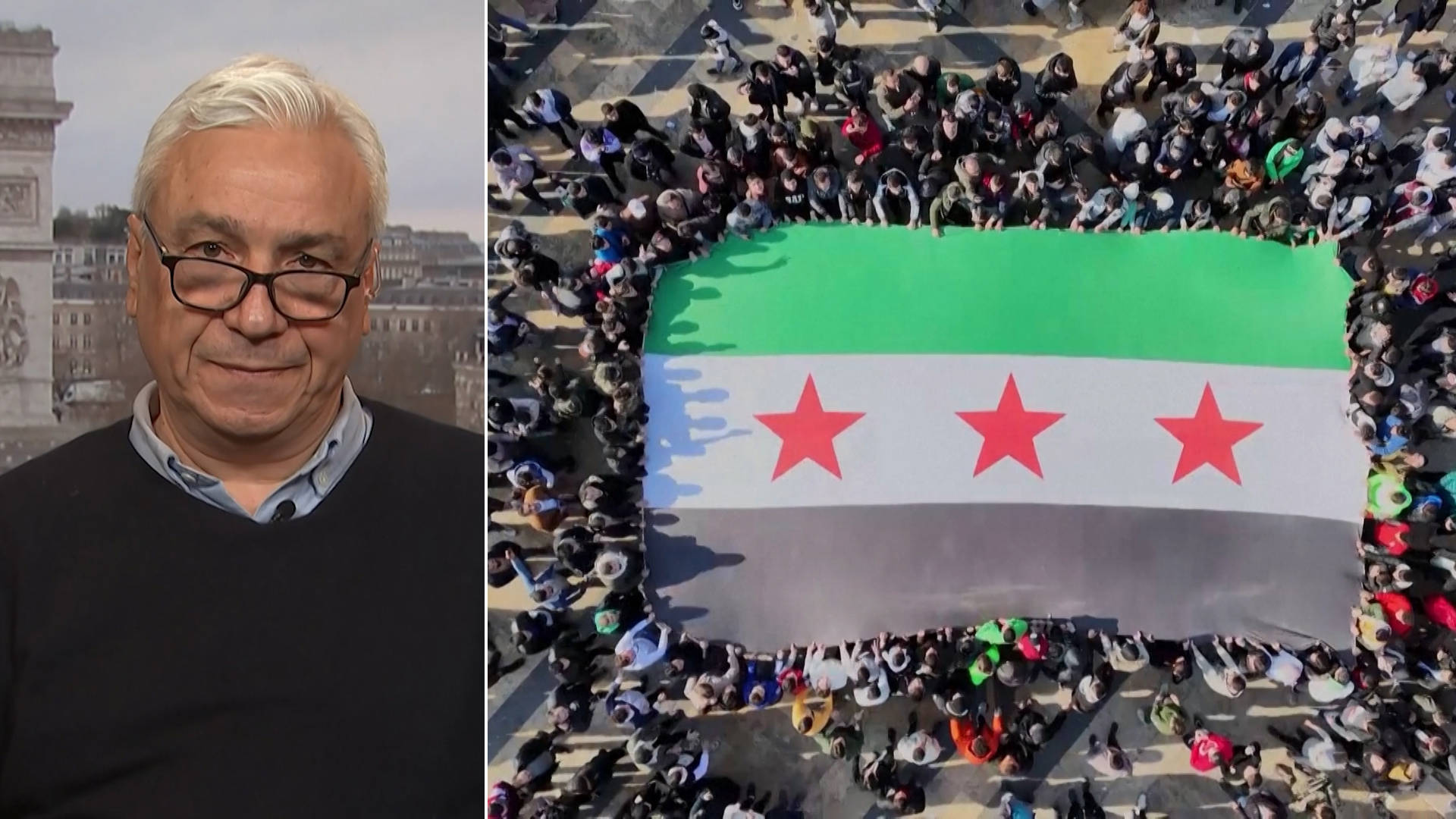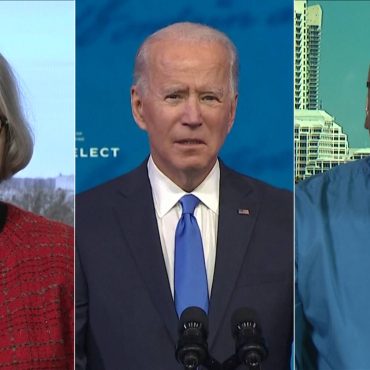This is a rush transcript. Copy may not be in its final form.
AMY GOODMAN: We spend the hour looking at the fall of the Syrian government and its impact on the Middle East and worldwide, after armed forces entered the capital city of Damascus Sunday, bringing an end to President Bashar al-Assad’s regime and his family’s more than 50-year rule.
Armed opposition groups have overthrown al-Assad’s regime in Syria following a lightning 12-day offensive. Assad has fled to Russia, where he’s been granted political asylum. Assad’s family had ruled Syria with an iron grip for more than half a century.
Thousands of Syrians living in exile have poured back into Syria, while tens of thousands of prisoners held by the Assad government have been freed. At the Sednaya prison in Damascus, rescue workers are now trying to access underground cells at a site that’s been described as a “human slaughterhouse.”
The uprising was led by Hayat Tahrir al-Sham, or HTS, a Turkish-backed group listed as a terrorist organization by the United States and the United Nations. Members of the group spoke on Sunday after seizing Syria’s state television station.
SYRIAN REBEL: [translated] In the name of God, the most gracious, the most merciful, by the grace of God almighty, the city of Damascus has been liberated. The tyrant Bashar al-Assad has been toppled, and all the unjustly detained persons from the regime’s prisons have been released. The Fatah Damascus Operation Room calls upon the mujahideen brothers and citizens to preserve all the properties of the free Syrian state. Long live a free and independent Syria for all Syrians of all sects.
AMY GOODMAN: As video showed prisoners streaming out of Assad’s notorious prisons, others celebrated inside Assad’s luxurious presidential palace. Scenes of celebration erupted across major Syrian cities. These are just a few voices from Aleppo, from Homs and from the capital Damascus.
SYRIAN 1: [translated] This is something else. Something else. May God help this country. And congratulations to all.
SYRIAN 2: [translated] This is the happiest day of my life. We were reborn. This is the day when the believers rejoice with God’s victory. Thank God. He gave us more than we deserve. Just some advice: Be united, and do not allow foreigners to come between you.
SYRIAN 3: [translated] Our happiness is immense. It’s priceless. Thank God we have no losses and no one has harmed anyone. We are just happy with our victory. We are also happy for the prisoners who have been released after years in prison. May God protect the rebels and grant them victory.
SYRIAN 4: [translated] First of all, I thank God for granting us the chance to see this place once more. After 10 years of fleeing Homs, I am returning today with my head held high in pride. Homs is free now. This is the Homs we dreamed of.
SYRIAN 5: [translated] I am a mechanical engineer. For years we have been waiting for this day. We have been resisting. We have been enduring. We have been holding on. And we’ve been waiting for this day until the regime fell. And finally, the regime has fallen. From now on, the Syrian people are one! The Syrian people are one! The Syrian people are one! The Syrian people are one!
AMY GOODMAN: Israel responded to the uprising in Syria by invading and seizing part of Syria’s Golan Heights and bombed a Syrian air base and weapons depots.
The United States carried out dozens of airstrikes inside Syria targeting areas held by the Islamic State. Meanwhile, in northern Syria, Turkish-backed armed groups have seized the city of Manbij, which had been controlled by U.S.-backed Syrian Kurdish forces.
President Joe Biden welcomed the Assad regime’s downfall as a “historic opportunity.”
PRESIDENT JOE BIDEN: After 13 years of civil war in Syrian and more than half a century of brutal authoritarian rule by Bashar Assad and his father before him, rebel forces have forced Assad to resign his office and flee the country. We’re not sure where he is, but there’s word that he’s in Moscow. At long last, the Assad regime has fallen.
AMY GOODMAN: For more on all of this, we begin in Paris with Yassin al-Haj Saleh, a Syrian writer, dissident, former political prisoner. He was jailed in Syria for 16 years, from 1980 to 1996. He’s the author of several books, including The Impossible Revolution: Making Sense of the Syrian Tragedy, also co-founder of the award-winning independent media platform AlJumhuriya.net.
Welcome back to Democracy Now! It’s great to have you with us, Yassin. If you can respond? You were out in the streets of Paris yesterday celebrating with many other Syrians. Assad is now in Russia, where he’s been granted asylum. Your response to what has happened and the lightning speed, would you say, that it’s happened in this last phase of the overthrow of the Assad regime?
YASSIN AL-HAJ SALEH: Hello, Amy, and thank you for having me.
So, among hundreds of people yesterday, I was at the Republic Square in Paris. We were overwhelmed by emotions, mine, I guess, similar to everybody else, crying, laughing and breathing. It was a rare moment of convergence of mourning and happiness and just feeling alive.
On the personal level, I lived almost all my life under this genocidal regime, and I felt as if tight hands were on my neck, on my throat, and for the first day I regained the ability to breathe. So, it is a great day, glorious day.
Everybody, I guess — of course, myself included — have many layers of feeling about this day. We need to turn out this dirty, criminal, discriminatory, fascist and very reactionary — I guess this is the right word to describe the Assad regime, because many in the West thinks that it is modernist, this is progressive. Far from it. So, we needed to turn out this page. And we are sure that many pages with difficulties, with hardships, with crisis, with struggles, with problems are ahead of us.
But the forever is over. And yesterday was the first day of history with all its problems and tensions and, of course, I mean, apprehensions. So, it was a mixed feeling. And there are many elements for hope. And, of course, there are other elements that I’d like to talk about, if you will allow me.
AMY GOODMAN: Yes. Why don’t you continue? But why don’t you start off by grounding us in your own experience? I mean, we’re sitting here looking at the Sednaya prison, the freeing of thousands of prisoners, many women, as you see them being told that they are now free. If you can talk about your own experience? Tell us about the Sednaya prison and its significance, and talk about why people were imprisoned.
YASSIN AL-HAJ SALEH: So, in my years in jail, I was not in Sednaya prison. And in those days, in the 1980s and ’90s, it was not the slaughterhouse as Amnesty International said some seven years ago, early 2017, I guess, in a very good report. It was before Sednaya. It was Tadmor prison, in which I spent only my last year of the 16 years, after I finished my sentence, by the way. I mean, look, I was arrested in 1980. I was, among hundreds of my comrades, brought to Supreme State Security Court only in April 1992, so at that time I was in jail for 11 years and four months. It took two years to get a sentence, and I got a sentence of 15 years. Instead of being released — by the way, the day before yesterday was the 44th anniversary of my arrest. Instead of being released in 1995, I was sent with 30 other people to Tadmor prison for an extra year. And Tadmor prison is the Sednaya of today. It is the most brutal jail in Syria. It is — well, it is a torture camp; it is not a prison. It is like Sednaya today.
These places are the factories to manufacture the essence of power in Syria. They are places of torture, of hunger, of humiliation and of extreme despair. And I believe that tens of thousands — you know that now we have 131 people, at least, we don’t know about their fate. So, many of them may be killed. The league of Sednaya prison former prisoners released a report a year and a half ago, I guess, and they took that maybe 30,000 to 35,000 were killed in Sednaya prison, mostly under torture, and some of them were executed. And many, I believe, died of hunger and of diseases.
So, it is — we’ve been under this inhuman condition for 54 years, which is more that a half of the whole Syrian history as a modern polity. Syria appeared only after the First World War. And more than half of its history is under the Assad rule, very thuggish, very corrupt. And you saw that it was rotten from inside. It fell in 11 days, without its foreign protectors, Russians, Iranians, the thugs of Hezbollah and other sectarian militias. The regime, we overwhelmed, so it fell in 11 days, because it is extremely rotten from inside.
So, this was my experience. And I feel very hopeful for the future of Syria because of the release of prisoners, because they gave — they have given the top priority for releasing these prisoners from many places, in Aleppo, in Hama, in Homs and now in Damascus, especially this torture camp of Sednaya.
AMY GOODMAN: Today, Yassin, is the 11th anniversary of the disappearance of your wife. Can you explain what happened to her?
YASSIN AL-HAJ SALEH: Well, because Syria, especially in 2013, so the third year of the Syrian uprising, is the most brutal, the most painful, the most tragic year of our struggle. So, Syria, by that time, let’s remember that it was the intervention, military intervention, of Hezbollah in Syria. It is the year of the appearance of Daesh, ISIS. It is the year of the chemical massacre. It is the year of the sordid American-Russian deal to absolve the regime from violating the international law, and disarming, taking away its chemical weapons. We find now that they were aware all the time that the regime kept a lot of chemical weapons. So, they were happy, or they were not unhappy, that these arms were used against — only against the Syrian people, now they are targeting them.
So, because Syria, by that year, was turning to a paradise of immunity and unaccountability, many factions seized the opportunity and started to act like the regime. Daesh is one of them. Another, Salafi military formation called Jaysh al-Islam in eastern Ghouta was one. And they took Samira, my wife, Samira Khalil, with Razan Zaitouneh, internationally known human rights activist and very good writer; Wael Hamada, her husband; and Nazem Hammadi, a lawyer and a poet. This happened today 11 years ago.
And for me, it is — as much as I am happy of the liberation of the bigger parts of my country, at the same time I see it as a criterion to judge these new developments now to liberate my wife and my friends, or to know about their fate, and to bring the culprits before justice. This is very important. We know the criminals by names.
And this is an opportunity for me just to say these simple words. This should end now. It is like releasing thousands of people from jail and trying to find out about the fate of others. Samira is one of these people. Samira and Razan and Wael and Nazem are among these people. And we need to know. We need them among us. We need to know about their fate. And we need to see a measure of justice. This will tell if the future of Syria will be better than its past.
AMY GOODMAN: I have a final question, Yassin. In one of your posts, you write, quote, “We can’t embrace HTS’s military effectiveness against the regime while ignoring its ideology.” In this last minute we have, if you can explain, one of the groups, the leading group, that overthrew the Assad regime?
YASSIN AL-HAJ SALEH: Amy, this was written in January 2013, so 11 years ago. And someone digged it out and published it, republished it on X.
So, of course, as you see, they are very effective militarily, but they have an ideology. And this is one reason why I am a bit worried, because this is one — this tension between the Islamic formation of the new liberators and the general seat of nationalism is one of my sources of worries.
Beside that, Assadism is not yet dead. Assad is gone, very cheaply and very — he showed how sordid and how trivial he was, but Assadism is still there in the form of sectarianism, corruption, thuggery, security complexes. Still we don’t know the fate about them.
And unhealthy — a third reason why I am a bit worried is a brutally unhealthy regional and international environment. You mentioned that the Israelis seized some Syrian lands. And they bombed in Damascus after Damascus was taken from the regime. This is colonial — I am not surprised by it, but Israel has been a plague for us for decades and for generations. But this will not go away from the Syrian memory.
AMY GOODMAN: Yassin al-Haj Saleh —
YASSIN AL-HAJ SALEH: If I have time —
AMY GOODMAN: We just have 30 seconds.
YASSIN AL-HAJ SALEH: OK. So, the reasons why I am a bit hopeful — I talked about my worries — is that the release of prisoners, the return of displaced people, from Turkey — from within the country, the camps are almost empty, and from Turkey and from Lebanon. And I guess many people from Europe are planning to go back. It is a Syrianized thing — it is not like what happened in Iraq 20, 21 years ago. The Syrians did it, and with minimal violations so far. I guess this is a sort of basis to build on for a better future.
AMY GOODMAN: Yassin al-Haj Saleh, Syrian writer, former political prisoner from 1980 to 1996, author of several books, including The Impossible Revolution: Making Sense of the Syrian Tragedy. He was speaking to us from Paris.
This is Democracy Now! When we come back, we turn to the Syrian American professor Bassam Haddad, head of the Arab Studies Institute at George Mason University. Stay with us.











Post comments (0)